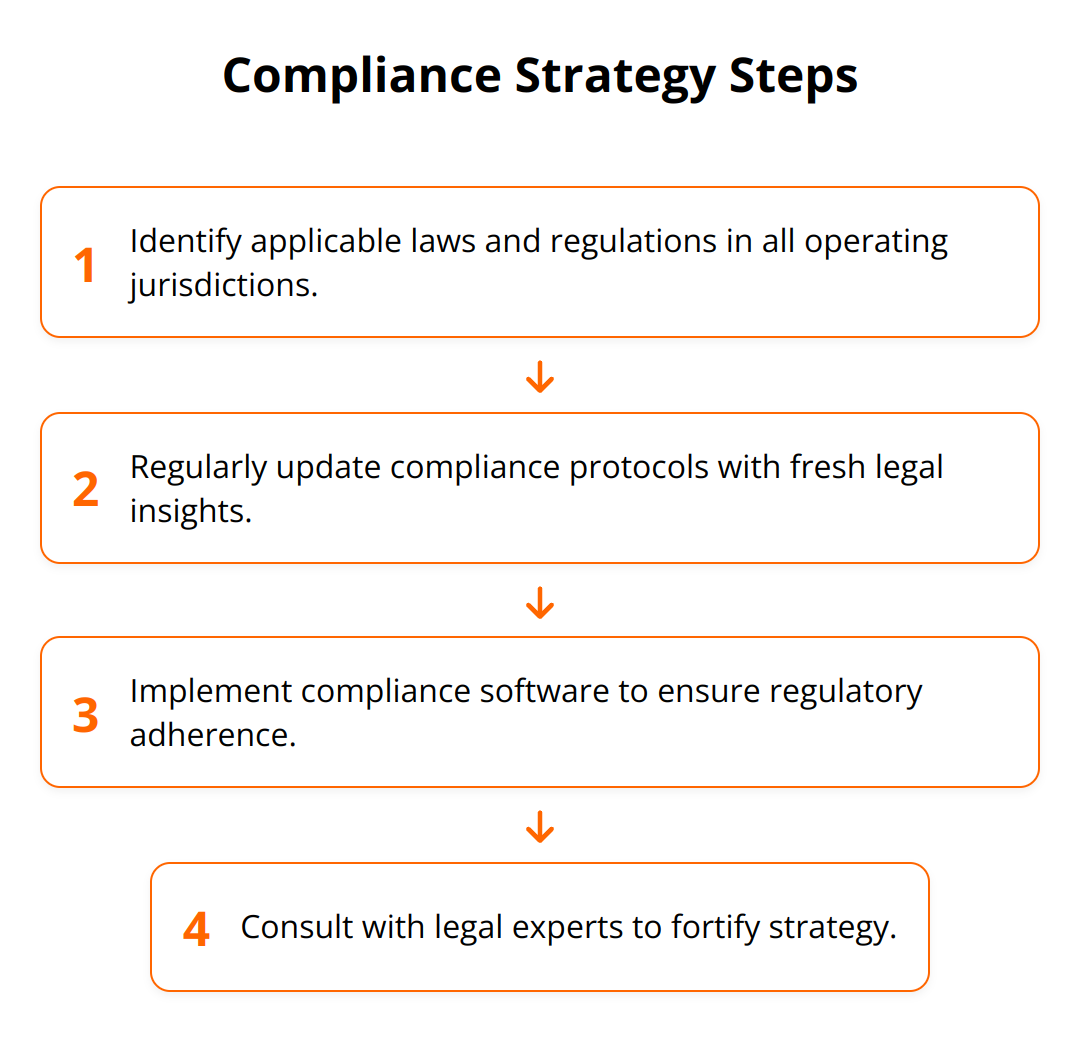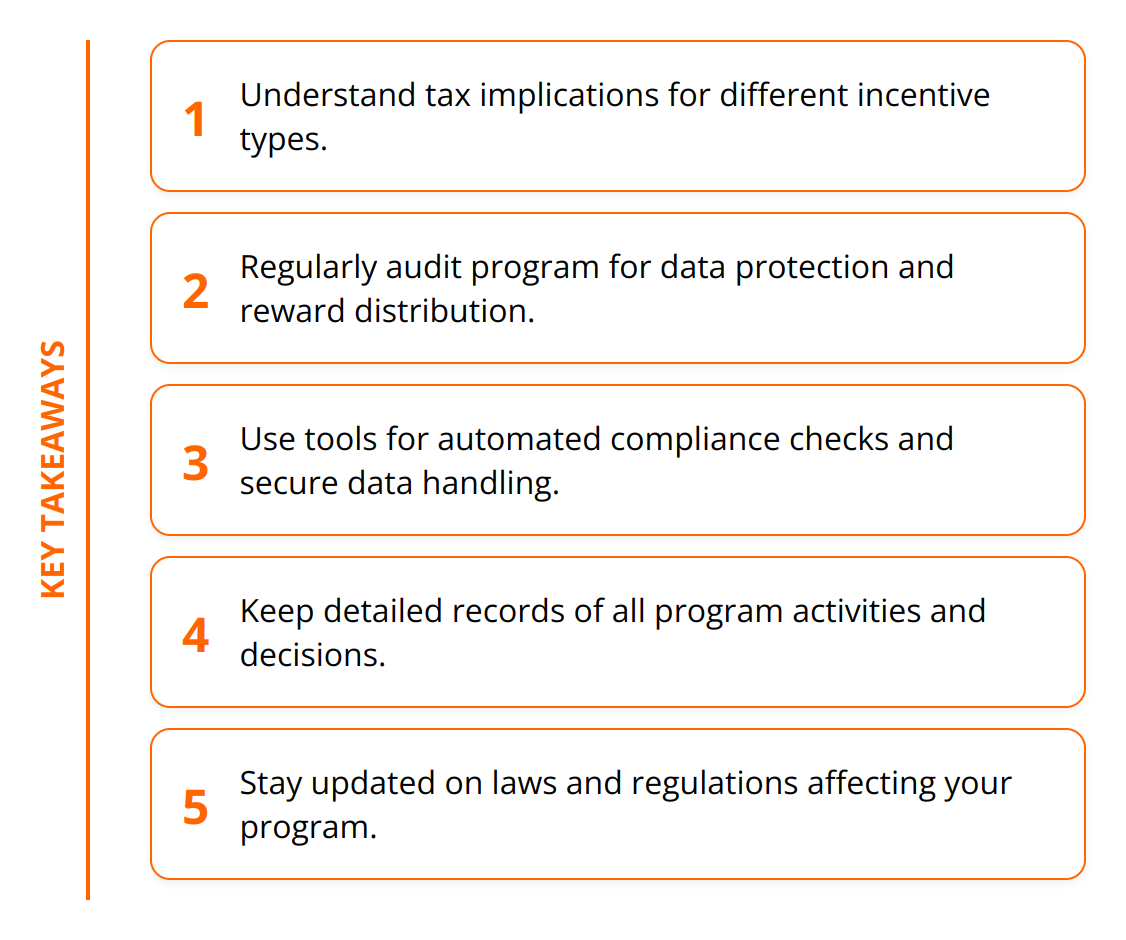
Navigating the intricacies of incentive program compliance can seem daunting at first glance. However, understanding the legalities and designing a program that aligns with these is paramount for businesses today. We at Reward the World believe that with the right knowledge and tools, businesses can effectively manage and even thrive through compliance challenges. This blog post aims to equip you with essential insights and practical tips to achieve just that.
Understanding Incentive Program Compliance
Navigating the complexities of incentive program compliance is not just about ticking boxes; it’s about building a framework that ensures your business thrives while adhering to legal standards. Recognizing the key elements of this framework can transform a daunting task into a manageable one.
Legal Framework Knowledge Is Power
The first step in mastering compliance is understanding the existing legal framework. Laws and regulations concerning incentive programs vary widely depending on factors such as the type of incentives, the recipients, and geographic locations. For instance, tax implications for cash rewards are different from those for non-cash incentives, and what’s permissible in one country might be frowned upon or even illegal in another.
Key points include:
- Grasping the tax implications of different incentive types.
- Knowing the legal distinctions between employee rewards and customer promotions.
- Recognizing the international laws that might impact your program if you operate globally.
Essential Regulations Businesses Should Know
Several regulations can impact your incentive program. For instance, the General Data Protection Regulation (GDPR) influences how you can collect, store, and use personal data from individuals in the EU, impacting how you administer rewards. In the U.S., the Health Insurance Portability and Accountability Act (HIPAA) might affect programs related to wellness incentives. Being uninformed is not an excuse in the eyes of the law, so ensuring you know which regulations apply to your program is essential.
Considerations include:
- The GDPR for personal data protection.
- Local tax laws and reporting requirements.
- Industry-specific regulations, such as HIPAA for health-related incentives.
Why Compliance Can’t Be Ignored
Ignoring compliance can be tempting, especially for small businesses or startups feeling bogged down by regulations. However, the ramifications of non-compliance – from hefty fines to damaged reputations – far outweigh the perceived hurdles of building a compliant program.
Important reasons to prioritize compliance include:
- Mitigating legal and financial risks.
- Building trust with participants through transparent operations.
- Enhancing the program’s effectiveness by aligning with best practices and ethical standards.

Strengthening your understanding of the incentive program compliance landscape is not just about avoiding negative consequences. It positions your business as credible and trustworthy, which in today’s market, is invaluable. Starting with a solid legal foundation and staying informed on regulatory changes can mean the difference between a program that merely exists and one that excels.

If you are new to this area remember that when operating loyalty rewards programs, market research incentives, or Employee Reward & Recognition programs, it is very important that the local rules and regulations are well understood and adhered to. The tax treatment of “rewards” and “gifts” can vary significantly between jurisdictions. and can incur tax liabilities on both the rewarder and the rewardee.
For example in the UK: “As long as you follow HMRC’s rules, you can give gifts that don’t exceed a value of £50 to your employees without any tax or national insurance (NI) charges arising. The cost of this is also tax-deductible by the company.” (December 2023). Note also that HMRC states that, “The benefit cannot be in the form of cash or cash vouchers“.
While in Spain, “the utilization of gift cards is subject to taxation as per the Personal Income Tax Law (IRPF) and the Value Added Tax Law (VAT). This implies that when a gift card is given to an employee or customer, it qualifies as a form of in-kind payment and is consequently liable to taxation.”
Bear in mind that most tax laws are open to change at least once per fiscal year, so it is always checking with your local finance department or tax experts concerning the local rules. See the section on The Complexity of Regulations below,
Building Compliance into Your Incentive Program
Creating an incentive program that is both engaging and compliant is essential for its success. Compliance should not be an afterthought but rather a foundational aspect of the program design. Here are practical steps to achieve this.
Start with Transparency
Transparency is key to building trust and meeting compliance standards. Clearly outline the terms and conditions of your incentive program, making sure participants understand how rewards are earned and distributed. This not only builds trust but also ensures that participants are fully aware of their rights and obligations.
Implement Effective Checks and Balances
Regular audits and reviews of your incentive program help identify potential compliance issues before they become problematic. Establish a routine for auditing your program, focusing on areas such as data protection, reward distribution, and adherence to terms and conditions. This proactive approach helps mitigate risks associated with non-compliance.
Choose the Right Tools and Software
Leveraging technology can significantly ease the burden of maintaining compliance. There are tools designed specifically for managing the complexities of incentive programs, from tracking participant activities to reporting and analysis. Selecting the right software is crucial for efficient monitoring and management of your program. Look for solutions that offer features like automated compliance checks, secure data handling, and customizable reporting. For insights into effective management of compliance, consider scaling your reward program and boosting survey participation, which further delves into the use of digital tools and strategies.
Practical Steps to Incorporate Compliance:
- Document Everything: Keep detailed records of all program activities and decisions. This is invaluable during audits and when addressing compliance queries.
- Stay Informed: Compliance requirements change. Stay up-to-date with the latest laws and regulations affecting your program.
- Train Your Team: Ensure everyone involved in the program understands their compliance responsibilities. Regular training sessions can help maintain high compliance standards.
- Engage Experts: Sometimes, the best action is seeking advice from legal or compliance experts, especially when expanding into new markets or dealing with complex regulatory frameworks.

By embedding compliance into the DNA of your incentive program, you not only protect your business but also enhance the overall value and appeal of your program to participants. Taking these steps ensures your program is robust, trustworthy, and poised for success.
Overcoming Compliance Hurdles
Navigating the maze of regulations that apply to incentive programs is a common challenge businesses face. When not addressed properly, these challenges can morph into significant legal and financial pitfalls. However, with a proactive approach and the right strategies, it’s possible to mitigate these risks and even turn compliance into a competitive advantage.
The Complexity of Regulations
One of the significant hurdles is the complexity and variability of regulations across different jurisdictions. For instance, tax laws, privacy regulations, and specific industry mandates can create a bewildering landscape for businesses to navigate.
Key strategies include:
- Conducting thorough research on all applicable laws in each jurisdiction where the program operates.
- Regularly updating compliance protocols to align with new or changing regulations.
- Utilizing compliance software that automates adherence to regulatory standards. scaling your reward program offers insights into how technology can assist.

Risk Mitigation
The risk of non-compliance can have serious repercussions, from fines to reputational damage. Effective risk management is, therefore, vital.
Practical steps involve:
- Developing a compliance checklist that covers all legal requirements.
- Establishing a monitoring system to detect deviations from compliance standards in real-time.
- Implementing training programs for employees involved in the management of incentive programs. Knowledge is a powerful tool in preserving compliance integrity.
Learning from Others
Looking at case studies where businesses successfully navigated compliance challenges can provide valuable insights. For example, a European company expanded into the U.S. market and had to drastically adjust its incentive program to comply with the specific regulations related to health information under HIPAA. By extensively researching and consulting with legal professionals, they redesigned their program to be fully compliant, thus avoiding potential penalties.
Similarly, a retail chain faced challenges with maintaining the anonymity of collected data under GDPR regulations. They pivoted to a cloud-based solution that ensured data anonymity and compliance with the stringent data protection laws, which in turn improved their program’s trustworthiness among consumers.
Takeaways from these experiences include:
- The importance of legal consultation when entering new markets or dealing with complex regulations.
- The value of investing in technology that supports compliance efforts.
In conclusion, while navigating incentive program compliance is undeniably complex, viewing it as an opportunity rather than a hindrance can lead to significant benefits. By embracing a proactive compliance strategy, incorporating the right technology, and learning from the challenges and successes of others, businesses can not only mitigate risks but also enhance the strength and integrity of their incentive programs.
Final Thoughts
To successfully navigate the complex environment of incentive program compliance, understanding the legal aspects and integrating effective strategies is essential. The importance of starting with a solid legal foundation, committing to transparency, and employing effective checks and balances cannot be overstated. Choosing the right tools and software plays a crucial role in easing the compliance journey, making programs not only compliant but also more engaging and effective.

Staying informed and proactive about regulatory changes and embracing technology are key strategies for overcoming compliance hurdles. Learning from others’ experiences and adapting strategies accordingly serves as a valuable resource for any business aiming to ensure their incentive programs are both compliant and successful.
In the fast-paced world where regulations continuously evolve, the significance of continuous improvement and adaptation in your compliance strategy is paramount. This approach not only mitigates risks but also positions your incentive program as a vehicle for enhancing credibility and trust with your participants.
Reward the World stands as a stellar example of how an incentive platform can meet the intricate demands of global compliance while delivering exceptional value to businesses and their audiences. Our platform’s 24/7 availability, seamless integration capabilities, and robust analytics ensure your program is not just compliant, but also a powerful tool for fostering engagement and driving results. Find out how you can elevate your incentive programs with us by exploring Reward the World.
We encourage businesses to view compliance not as a barrier but as an opportunity to refine and strengthen their incentive programs. By staying informed, utilizing the right resources, and continually adapting to the legal landscape, your business can reap the benefits of a compliant, effective, and trusted incentive program.
